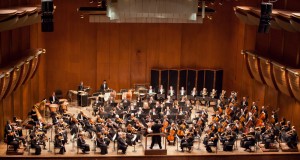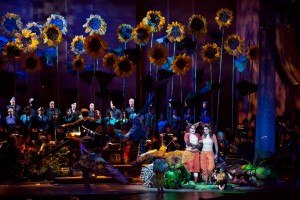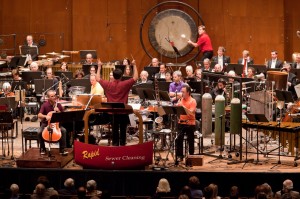by Sedgwick Clark
Alan Gilbert and the New York Philharmonic are on a European tour for a couple of weeks, and for a change I didn’t roll my eyes in despair when I saw the list of repertoire. His predecessors as music director, Kurt Masur and Lorin Maazel, for all their superb work at building the ensemble, utilized Dvořák’s “New World” Symphony (1894) as the orchestra’s calling card. But not only has Gilbert leapt ahead half a century to show off the ensemble with another Philharmonic commission conducted by its composer at its premiere, Stravinsky’s Symphony in Three Movements (1946), on February 17 he has included the U.K. premiere of Thomas Adès’s hot-off-the-press Polaris, which the Phil played in its New York City premiere only a month ago. Moreover, he has also programmed Composer in Residence Magnus Lindberg’s 1997 Féria three times.
The repertoire list below must come as a genuine jolt to anyone who has looked at how the orchestra presents itself to the world. Not even Zubin Mehta, who was not averse to contemporary music during his tenure, had the nerve to acknowledge the 20th century so thoroughly on tour. The only German chestnut here is the Beethoven Violin Concerto. And while Lang Lang plays the First Tchaikovsky Piano Concerto three times, he also plays Bartók’s Second Concerto thrice on a bracing program that begins with the Lindberg piece and ends with Prokofiev’s Fifth Symphony.
Don’t get me wrong. These programs are hardly the adventures of the Boulez years. But when it seems that everyone’s idea of selling tickets these days is to advance to the rear, I applaud Gilbert and my home orchestra for making a statement on tour with meaty works by Bartók, Stravinsky, and Prokofiev and hors d’oeuvres by Adès and Lindberg.
EUROPE / WINTER 2012
New York Philharmonic
Alan Gilbert, conductor
Feb. 2, 8:00 pm (Cologne, Philharmonie)
Frank Peter Zimmermann, violin
Beethoven: Violin Concerto
Stravinsky: Symphony in Three Movements
Ravel: Daphnis and Chloe Suite No. 2
Feb. 3, 8:00 pm (Luxembourg, Salle de Concerts)
Frank Peter Zimmermann, violin
Beethoven: Violin Concerto
Stravinsky: Symphony in Three Movements
Ravel: Daphnis and Chloe Suite No. 2
Feb. 4, 8:00 pm (Luxembourg, Salle de Concerts)
Lang Lang, piano
Tchaikovsky: Piano Concerto No. 1
Prokofiev: Symphony No. 5
Feb. 6, 8:00 pm (Paris, Salle Pleyel)
Frank Peter Zimmermann, violin
Beethoven: Violin Concerto
Stravinsky: Symphony in Three Movements
Ravel: Daphnis and Chloe Suite No. 2
Feb. 7, 8:00 pm (Paris, Salle Pleyel)
Lang Lang, piano
Lindberg: Féria
Bartók: Piano Concerto No. 2
Prokofiev: Symphony No. 5
Feb. 8, 8:00 pm (Frankfurt, Alte Oper)
Lang Lang, piano
Lindberg: Féria
Bartók: Piano Concerto No. 2
Prokofiev: Symphony No. 5
Feb. 9, 8:00 pm (Frankfurt, Alte Oper)
Frank Peter Zimmermann, violin
Beethoven: Violin Concerto
Stravinsky: Symphony in Three Movements
Ravel: Daphnis and Chloe Suite No. 2
Feb. 11, 8:00 pm (Düsseldorf, Tonhalle)
Lang Lang, Piano
Tchaikovsky: Piano Concerto No. 1
Prokofiev: Symphony No. 5
Feb. 1, 8:15 pm (Amsterdam, Concertgebouw)
Frank Peter Zimmermann, violin
Beethoven: Violin Concerto
Stravinsky: Symphony in Three Movements
Ravel: Daphnis and Chloe Suite No. 2
Feb. 14, 8:15 pm (Amsterdam, Concertgebouw)
Lang Lang, piano
Tchaikovsky: Piano Concerto No. 1
Prokofiev: Symphony No. 5
Feb. 16, 7:30 pm (London, Barbican)
Mahler: Symphony No. 9
Feb. 17, 7:30 pm (London, Barbican)
Joyce DiDonato, mezzo-soprano
Adès: Polaris (U.K. Premiere)
Berlioz: Les nuits d’été
Stravinsky: Symphony in Three Movements
Ravel: Daphnis and Chloe Suite No. 2
Feb. 18, 4:00 p.m. (London, Barbican)
Young People’s Concert: Bernstein’s New York
Leonard Bernstein’s New York
Jamie Bernstein, host
Benjamin Grosvenor, piano
Bernstein/Peress: Overture to West Side Story
Copland: “Skyline” from Music for a Great City�
Strayhorn: “Take the ‘A’ Train”
Bernstein: “Ain’t Got No Tears Left,” from On the Town
Bernstein: “The Masque,” from Symphony No. 2, The Age of Anxiety
Bernstein: Three Dance Episodes from On the Town
The Great Lover
Lonely Town Pas de Deux
Times Square 1944
Feb. 18, 8:00 p.m. (London, Barbican)
Lang Lang, piano
Lindberg: Féria
Bartók: Piano Concerto No. 2
Prokofiev: Symphony No. 5
Stage Door Johnny Dept.
Tuesday night while picking up tickets for Porgy and Bess, I found myself standing next to playwright Neil Simon. I try not to bother celebrities, and I succeeded for a few seconds, but I couldn’t resist telling him that on my first night after moving to New York from Muncie over 43 years ago I saw George C. Scott and Maureen Stapleton in his Plaza Suite on Broadway, and what a great introduction it was to my new home. He seemed genuinely pleased and thanked me for telling him. A nice man.
Looking Forward
My week’s scheduled concerts:
2/8 Peter Jay Sharp Theater. Gluck: Armide. Juilliard Orchestra/Jane Glover. Emalie Savoy (Armide), Alexander Hajek (Hidraot), David Portillo (Renaud), Alexander Lewis (Artémidore), Luthando Qave (Ubalde), Noah Baetge (Le Chevalier Danois), Wallis Giunta (Phénice), Devon Guthrie (Sidonie), Evan Hughes (Aronte), Renée Tatum (La Haine), Soo Yeon Kim (La Naïade), Pureum Jo (2nd Coryphée), Deanna Breiwick (Une Bergère), Lilla Heinrich-Szász (Lucinde), and Raquel González (Mélisse).
2/14 Carnegie Hall. Philadelphia Orchestra/Charles Dutoit; James Ehnes/violin. Martin: Concerto for Seven Wind Instruments. Mendelssohn: Violin Concerto. Bartók: Concerto for Orchestra.


